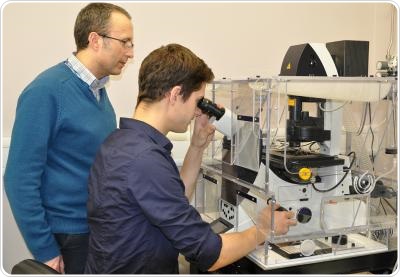A new study from the University of Southampton has provided scientists with a better understanding of why chromosome errors are high in women's eggs.
It is estimated that up to 60 per cent of eggs are affected by errors in how their chromosomes divide, making it the leading cause of infertility. Chromosome errors also lead to conditions such as Down Syndrome and early pregnancy loss.

Keith Jones (standing) and Simon Lane
By using state-of-the-art imaging techniques, the Southampton researchers examined the most important process present in all cells to prevent chromosome errors - the Spindle Assembly Checkpoint (SAC) - and looked at how it behaves in oocytes (developing female sex cells). The SAC acts as a gatekeeper, only allowing a cell to pass through (and so divide) if its chromosomes are all ready to do so, in order to preserve the cell's identity and proper function. If cells don't have a SAC, or the SAC is damaged in some way when cells divide, often the female cells inherit the wrong number of chromosomes.
The researchers, Dr Simon Lane and Professor Keith Jones from the University's Centre for Biological Sciences, found differences in the way SAC operates in eggs to all other cells. Dr Lane says: "We found that in oocytes, the classical model of how this gatekeeper works, from a closed gate to open gate, doesn't operate: instead the gate is continually left ajar. As such, an oocyte can divide its chromosomes and becomes aneuploid - a cell with fewer or more chromosomes than usual - quite easily, because the SAC isn't preventing the division."
Professor Keith Jones, who is Head of the Centre for Biological Sciences, says: "Our findings won't provide an immediate cure for preventing errors, but it gives us a better understanding for what is controlling chromosome division in eggs. Armed with such knowledge, we could potentially find ways of improving this control mechanism or alternatively find ways of screening eggs as they are dividing to detect a good egg from a bad egg - although this screening would obviously only benefit people in an IVF setting where eggs are recovered from the patient."